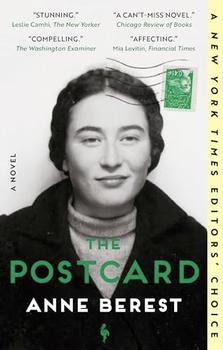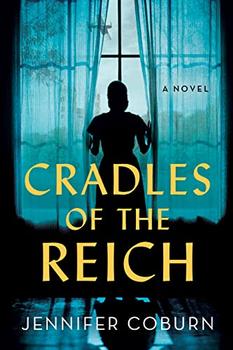Summary | Excerpt | Reviews | Beyond the book | Read-Alikes | Genres & Themes | Author Bio

The publisher's blurb about Trieste, the first novel published in English by Croatian author Daša Drndć, does not begin to convey the harrowing intensity of this riveting, singular work. The book illuminates the history of the Italian Jews of northern Italy under German SS occupation during World War II. This is filtered through the memories and experiences of Haya Tedeschi, an eighty-two-year-old Catholicized Jewish woman who was twenty when her infant son was taken away as part of Heinrich Himmler's Lebensborn program.
It is now 2006 and at long last, Haya is looking forward to meeting her son in her hometown of Gorizia, Italy, a town that borders Slovenia. Gorizia, a few miles north of Trieste, is where Haya has lived since the war. Throughout the course of the sixty-two years since five-month-old Antonio Tedeschi, bastard son of a high-ranking SS officer, was snatched from Haya, she has amassed the traces of her dogged, relentless search for his whereabouts. Trieste's crucible is Haya's oversized, knee-high red basket stuffed to overflowing with a few photographs, fragments of poetry, news clippings, maps, transcripts of the Nuremberg trials, excerpts of eyewitness accounts of atrocities from Trieste's own San Sabba concentration camp and more recently released archival records relating to Himmler's Lebensborn program. These are mixed in with mementos and letters from family.
As Haya Tedeschi's life story is subsumed by the harsh lessons of history; one may be tempted to question: "Where is the novel?" Trieste skips around in time and place, that red basket a metaphor for the fragmentary remembrances, making it difficult at times to read and absorb, and assuredly demanding of a reader's full attention. The story's primary driver is this physically robust survivor who passes the time by removing and examining each item in the basket, lost in thought; reflecting upon her role in the brutal history of the era through the opened floodgates of non-linear, disparate memories.
Trieste may be considered as an exploration of the unequal treatment of Italian Jews during WWII with the brunt of the atrocities committed in the northeastern corner of the country that fell under direct occupation by the Nazis. The author is unsparing in her graphic descriptions of unimaginable acts of brutality, the random acts of torture, infanticide and murder – making the novel unsuitable for squeamish readers.
This addition to the canon of Holocaust literature blends facts and fiction and blurs their distinction. Drndić meticulously backs her extensive research with lengthy footnotes that flow in a constant undercurrent beneath the body of fiction. Also included is an alphabetical listing of approximately 9,000 Jews who were deported from Italy to death camps in Poland. Among those names were 2,000 Sephardic Jews from the thriving, historic community established in Rhodes after Spain expelled the Jews in the 15th century. Seeing several with the surnames "Alhadeff and Franco," relatives of old friends who were unable to be rescued, brought me to tears.
Trieste is a brilliant, original conceptualized novel consisting of fragmented memories and a series of concentrated history lessons that will challenge a reader with its irregular construction and seeming lack of continuity. It may not be easy but it is well worth reading and will assuredly linger in memory. This novel has already prompted me to learn more about the Italian Holocaust and the Lebensborn project; and to revisit our bookshelves containing Holocaust literature, diaries and histories.
Much as the Spanish Jewish "Conversos" suddenly embraced Catholicism prior to the 15th century Inquisition, many Italian Jews converted after the stricter 'race' laws were instigated in fascist Italy in 1938. These were doubtlessly greeted with questions of sincerity. Protagonist Haya, indeed, is callously reminded by her SS lover that 'Tedeschi' is a known Jewish name, a pointed reminder his beneficence has kept her immediate family from deportation. For sixty-two years, Haya has borne her sorrows privately while tenaciously seeking the son from this union; her unwilled and unwitting contribution to Himmler's Lebensborn project kidnapped for adoption in the Fatherland.
The open-ended question remains as to who can judge what was done during wartime to ensure the survival of an individual or to protect their family. How do survivors cope with the guilt of their good fortune to have been spared? We are left with this fragment of verse from Haya's son Antonio/Hans Traube:
What is that sound high in the air?
Murmur of maternal lamentation, she will say.
![]() This review was originally published in The BookBrowse Review in February 2014, and has been updated for the
March 2015 edition.
Click here to go to this issue.
This review was originally published in The BookBrowse Review in February 2014, and has been updated for the
March 2015 edition.
Click here to go to this issue.

If you liked Trieste, try these:

by Anne Berest
Published 2024
Anne Berest's The Postcard is among the most acclaimed and beloved French novels of recent years. Luminous and gripping to the very last page, it is an enthralling investigation into family secrets, a poignant tale of mothers and daughters, and a vivid portrait of twentieth-century Parisian intellectual and artistic life.

by Jennifer Coburn
Published 2023
Three women, a nation seduced by a madman, and the Nazi breeding program to create a so-called master race.
Great political questions stir the deepest nature of one-half the nation, but they pass far above and over the ...
Click Here to find out who said this, as well as discovering other famous literary quotes!
Your guide toexceptional books
BookBrowse seeks out and recommends the best in contemporary fiction and nonfiction—books that not only engage and entertain but also deepen our understanding of ourselves and the world around us.